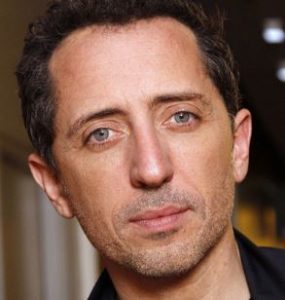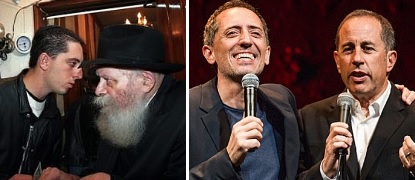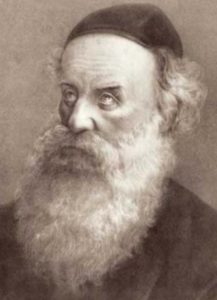“The French Jerry Seinfeld”
 Gad Elmaleh (b. 1971) was born in Casablanca, Morocco to a traditional Sephardic family. He went to a religious Jewish school (the only one that would have him after being expelled from everywhere else), and spent summers at a Chabad camp. After high school, he studied political science at the University of Montreal. Having grown up in a family of performers, and acting since he was a child, Elmaleh decided to pursue his passion for drama instead. At age 21, he moved to Paris and enrolled at the Cours Florent, one of France’s most prestigious acting schools. Elmaleh became a comedian, and his first stand-up show was a huge success. His second, performed in Paris’ famous Olympia, was even bigger, while his third show drew 300,000 spectators and sold 1.5 million DVDs. His fifth show, in 2007, sold out for weeks, selling over a million tickets. That same year, he was voted the funniest man in France. Elmaleh has been credited with bringing American-style stand-up to the country, and has been called “the French Jerry Seinfeld”. Indeed, Seinfeld was Elmaleh’s greatest inspiration, and the latter would go on to appear on Seinfeld’s show, Comedians in Cars Getting Coffee. (Elmaleh was also the voice of Seinfeld in the French version of Bee Movie.) In 2015, Elmaleh moved to New York and went on his first American tour, “Oh My Gad”. In the past two years, he has had two Netflix specials, in French and in English. He has also performed in Hebrew and in Arabic. Elmaleh has appeared in dozens of films, was awarded the Order of France and the National Order of Quebec, has a child with a European princess (and another with a famous French actress), and is a good friend of (former Jew of the Week) Diane von Fürstenberg. See Elmaleh describe his embarrassing first encounter with Jerry Seinfeld here.
Gad Elmaleh (b. 1971) was born in Casablanca, Morocco to a traditional Sephardic family. He went to a religious Jewish school (the only one that would have him after being expelled from everywhere else), and spent summers at a Chabad camp. After high school, he studied political science at the University of Montreal. Having grown up in a family of performers, and acting since he was a child, Elmaleh decided to pursue his passion for drama instead. At age 21, he moved to Paris and enrolled at the Cours Florent, one of France’s most prestigious acting schools. Elmaleh became a comedian, and his first stand-up show was a huge success. His second, performed in Paris’ famous Olympia, was even bigger, while his third show drew 300,000 spectators and sold 1.5 million DVDs. His fifth show, in 2007, sold out for weeks, selling over a million tickets. That same year, he was voted the funniest man in France. Elmaleh has been credited with bringing American-style stand-up to the country, and has been called “the French Jerry Seinfeld”. Indeed, Seinfeld was Elmaleh’s greatest inspiration, and the latter would go on to appear on Seinfeld’s show, Comedians in Cars Getting Coffee. (Elmaleh was also the voice of Seinfeld in the French version of Bee Movie.) In 2015, Elmaleh moved to New York and went on his first American tour, “Oh My Gad”. In the past two years, he has had two Netflix specials, in French and in English. He has also performed in Hebrew and in Arabic. Elmaleh has appeared in dozens of films, was awarded the Order of France and the National Order of Quebec, has a child with a European princess (and another with a famous French actress), and is a good friend of (former Jew of the Week) Diane von Fürstenberg. See Elmaleh describe his embarrassing first encounter with Jerry Seinfeld here.
The Origins and Kabbalah of Kaddish
Words of the Week
Though Jews presently constitute 3 percent of the total American population, the number of Jews imprisoned for crimes of violence is but one tenth of one percent of the prison population… This tremendous disproportion in the statistic continually amazes sociologists.
– Max I. Dimont, Jews, God and History

Elmaleh meeting the Lubavitcher Rebbe as a young man, and more recently alongside Jerry Seinfeld.

 Schneur Zalman of Liadi (1745-1812) was born in the shtetl of Liozna in what is now Belarus. A child prodigy, he wrote his first commentary on the Torah when he was eight years old. Shortly after, he was sent to the nearby town of Lubavitch to begin advanced Talmudic studies, and was sent back home at the age of 12 as he had surpassed the knowledge of his teachers. He married at 15, and around the same time was first exposed to Kabbalah by two Bohemian refugees that settled in Liozna. They also taught him math, astronomy, and philosophy. A few years later, Rav Schneur Zalman met the Hasidic master Dov Ber, “the Maggid [Preacher] of Mezeritch”, who was himself the disciple of the
Schneur Zalman of Liadi (1745-1812) was born in the shtetl of Liozna in what is now Belarus. A child prodigy, he wrote his first commentary on the Torah when he was eight years old. Shortly after, he was sent to the nearby town of Lubavitch to begin advanced Talmudic studies, and was sent back home at the age of 12 as he had surpassed the knowledge of his teachers. He married at 15, and around the same time was first exposed to Kabbalah by two Bohemian refugees that settled in Liozna. They also taught him math, astronomy, and philosophy. A few years later, Rav Schneur Zalman met the Hasidic master Dov Ber, “the Maggid [Preacher] of Mezeritch”, who was himself the disciple of the 
 Aaron Rajman (1992-2017) was born in the Bronx to an observant Jewish family. When he was four years old, the family moved to Florida. In his teen years, Rajman got involved with a bad crowd and struggled in his personal life. However, he soon got back onto the right path by returning to his religious roots, and taking up mixed martial arts. Rajman joined the American Top Team gym, one of the premier MMA training facilities in the US. He started racking up amateur wins, and earned six different titles before turning pro. His overall record was an impressive 21 wins to 4 losses. Despite his success in the ring, Rajman did not abandon his faith, making sure to keep the Sabbath and stay kosher. He was nicknamed “the Matzah Brawler”. Rajman was also an avid cook, and regularly hosted friends and family for Shabbat meals. In his spare time, he taught self defense in his community, and instructed local police officers in Krav Maga. After his father passed away from cancer, Rajman fought a number of charity bouts, donating the proceeds to the American Cancer Society. Earlier this week, Rajman was recovering from a leg injury when a group of thugs broke in to his home and fatally shot him. It was just a week after his twenty-fifth birthday. His community in West Boca Raton remembers him as a “sensitive, caring and kindhearted soul.” Donations to his burial fund can be made
Aaron Rajman (1992-2017) was born in the Bronx to an observant Jewish family. When he was four years old, the family moved to Florida. In his teen years, Rajman got involved with a bad crowd and struggled in his personal life. However, he soon got back onto the right path by returning to his religious roots, and taking up mixed martial arts. Rajman joined the American Top Team gym, one of the premier MMA training facilities in the US. He started racking up amateur wins, and earned six different titles before turning pro. His overall record was an impressive 21 wins to 4 losses. Despite his success in the ring, Rajman did not abandon his faith, making sure to keep the Sabbath and stay kosher. He was nicknamed “the Matzah Brawler”. Rajman was also an avid cook, and regularly hosted friends and family for Shabbat meals. In his spare time, he taught self defense in his community, and instructed local police officers in Krav Maga. After his father passed away from cancer, Rajman fought a number of charity bouts, donating the proceeds to the American Cancer Society. Earlier this week, Rajman was recovering from a leg injury when a group of thugs broke in to his home and fatally shot him. It was just a week after his twenty-fifth birthday. His community in West Boca Raton remembers him as a “sensitive, caring and kindhearted soul.” Donations to his burial fund can be made